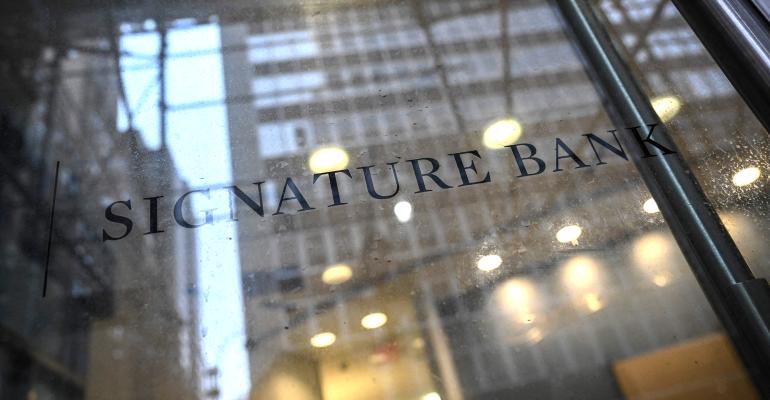(Bloomberg) -- Signature Bank’s deposits and some of its loans have been taken over by a unit of New York Community Bancorp, a move that could help calm some of the turmoil that has engulfed US regional banks.
NYCB’s Flagstar Bank of Hicksville, New York, agreed to purchase $38 billion of assets, including $25 billion in cash and about $13 billion in loans, from the Federal Deposit Insurance Corp., the lender said in a statement. It also assumed liabilities of about $36 billion, including $34 billion in deposits.
Signature’s 40 branches will operate as Flagstar locations as of Monday. The bank was seized on March 12 without another lender ready to take over, which regulators typically strive to have in place before shutting a bank.
As part of the deal, the FDIC gets equity appreciation rights in New York Community Bancorp common stock valued at up to $300 million.
While the sale didn’t manage to offload all of Signature, the deal demonstrates there are purchasers out there for such assets and strength among banks, said Todd Phillips, a fellow at the Roosevelt Institute and former FDIC attorney. “To the extent that the market is looking for a sign here, it definitely does show that there is still health in the banking system,” he said.
What’s Excluded
Flagstar’s bid excluded about $4 billion of deposits related to Signature’s digital banking business, the FDIC said. Those deposits will be provided directly to customers tied to digital banking, it said.
Signature was among three major US banks that collapsed in rapid succession this month, raising concern that a contagion was spreading among US banks as they tried to adjust to the rapid rise in interest rates that devalued their holdings. On top of that, US prosecutors were investigating New York-based Signature Bank’s work with crypto clients.
Regulators lost faith in management and swooped in this month to seize the lender, along with larger Silicon Valley Bank. The failures of those two firms as well as the collapse days earlier of Silvergate Capital Corp., another crypto-friendly lender, stoked concerns about spillover effects to other regional lenders and the wider economy.
Much like Silicon Valley Bank, with clients made up almost entirely of businesses, Signature had a deposit base that was mostly uninsured. That may have attracted the attention of regulators looking into the stability of banks with large uninsured deposit bases.
Todd Baker, a senior fellow at Columbia University’s Richard Paul Richman Center for Business, Law, and Public Policy, called the FDIC’s deal a very positive sign. “I particularly liked the FDIC getting an equity kicker based on the performance of NYCB’s stock. This shows how the regulatory agencies are getting smarter.”
The FDIC had transferred all Signature Bank deposits and substantially all of the firm’s assets to Signature Bridge Bank NA before the Flagstar deal. New York Community Bancorp acquired Flagstar last year for about $2.6 billion.
NYCB is a major player in New York City real estate, with multi-family mortgage loans in the city making up nearly a third of NYCB’s total loan book as of year-end. In a filing earlier this month, the firm described multi-family loans as its “principal asset,” noting the majority of them are secured by rental apartment buildings.
“NYCB and Signature have similar strategies and culture as well as overlap in commercial real estate,” Bloomberg Intelligence analysts Herman Chan and Sergio Ferreira said in a research note Sunday before the announcement. “Yet buying Signature would seemingly bump the combined bank above $100 billion in assets and usher in tougher regulatory requirements.”
--With assistance from Gillian Tan, Jenny Surane, Max Reyes, Hannah Levitt and Sridhar Natarajan.
© 2023 Bloomberg L.P.





